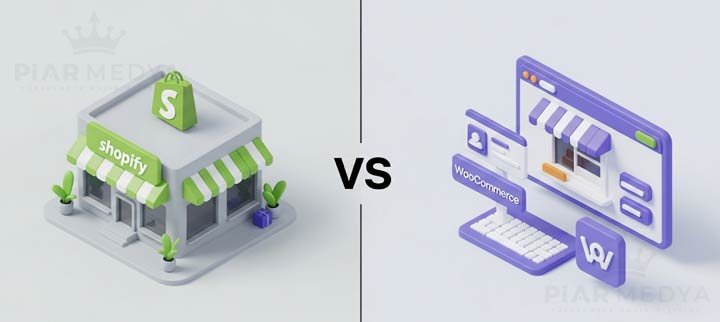The Right Decision for Your Business: Shopify or WooCommerce?
The most critical decision when starting e-commerce: Shopify or WooCommerce? The most comprehensive comparison for 2025 in terms of cost, SEO, ease of use, and flexibility. You will find answers to all your questions related to topic The Right Decision for Your Business: Shopify or WooCommerce? in the continuation of the text.

E-commerce Platform Selection: A Detailed Comparison of Shopify and WooCommerce
A Quick Look: What Are Shopify and WooCommerce?
Shopify: The Turnkey Store
WooCommerce: Take Control of Your Own Business
Detailed Comparison by Criteria (2025 Perspective)
1. Ease of Use
2. Cost and Pricing
3. Design and Flexibility
4. SEO and Marketing Tools
5. Security and Maintenance
Summary: Which Platform is Right for Whom?
Can't Decide? Here's How We at Piar Medya Can Help
E-commerce Platform Selection: A Detailed Comparison of Shopify and WooCommerce
You've decided to step into the world of e-commerce, that's great! Your ideas, products, and goals are ready. But now, you face a critical question that will form the foundation of your entire project: On which foundation will you build your digital store? In the e-commerce space, two giants stand out: Shopify, known for its ease of use, and WooCommerce, praised for its flexibility. So, in 2025, which one is the right choice for your business model, budget, and technical knowledge?
The decision you make is not just a platform choice; it is an investment that will shape the future of your business. As Piar Medya, we're putting both platforms on the table, with all their pros and cons, to help you make an informed decision.
Our guide will not only list features but also help you understand which platform is more strategic for you to build a successful online store.
A Quick Look: What Are Shopify and WooCommerce?
Before we start the comparison, let's understand the core philosophies of the two platforms.
Shopify: The Turnkey Store
Shopify is a SaaS (Software as a Service) platform. You can think of it as renting a store in a ready-made, luxurious shopping mall. Shopify handles all the technical details like security, hosting, and software updates. All you have to do is upload your products and start selling. Its user-friendly interface makes it an ideal starting point for those without technical knowledge.
WooCommerce: Take Control of Your Own Business
WooCommerce is a free, open-source e-commerce plugin developed for WordPress, the world's most popular content management system. You can think of this as buying your own land and building the store of your dreams on it. You have complete flexibility and control, but everything from the safety of the land (hosting, security) to the maintenance of the building (updates) is your responsibility.
Detailed Comparison by Criteria (2025 Perspective)
Let's examine the two platforms based on the most important criteria:
1. Ease of Use
Shopify: Is the clear winner in terms of ease of use. Thanks to its intuitive and drag-and-drop interface, even someone who has never built a website before can get their store online in minutes. Everything is managed from a single dashboard, which speeds up the learning process incredibly.
WooCommerce: Requires a learning curve. First, you need to be familiar with WordPress. Installing plugins, configuring settings, and managing the store involves more technical steps compared to Shopify. However, once you learn it, the level of control it offers is unmatched.
2. Cost and Pricing
It would be misleading to call one "cheap" or "expensive." It is more accurate to categorize the costs as "Predictable" and "Variable."
Shopify: Its pricing is straightforward. You pay a fixed monthly subscription fee (which typically starts at $29) and transaction fees that vary based on the payment gateway you use. While it may seem more expensive initially, it has no hidden costs like hosting and security.
WooCommerce: The plugin itself is free. However, you must pay for a domain name, hosting, an SSL certificate, and potentially premium themes and plugins. Costs might be lower at the beginning but can increase as your site grows and requires more powerful hosting.
3. Design and Flexibility
Shopify: Has a wide range of modern and professional themes, both free and paid (premium). Basic changes like colors and fonts are easy to make on the themes. However, in-depth design customization is difficult and requires coding knowledge.
WooCommerce: Is unrivaled in design flexibility. There are thousands of free and paid theme options. With page builder plugins like Elementor, you can create the design of your dreams without writing a single line of code. For those who want to create a completely unique, user-experience focused design, WooCommerce offers more freedom.
4. SEO and Marketing Tools
Both platforms have strong foundations for SEO.
Shopify: Many of the essential SEO tools (meta titles/descriptions, sitemap, 301 redirects, etc.) are built-in. Its blogging infrastructure is also quite good.
WooCommerce: Leans on the power of WordPress. With advanced plugins like Yoast SEO or Rank Math, you can have much more in-depth control over your SEO. With comprehensive professional SEO support, WooCommerce's potential is higher.
5. Security and Maintenance
Shopify: All security, server maintenance, backups, and software updates are handled automatically by Shopify. This removes a significant burden for business owners and provides peace of mind.
WooCommerce: Security and maintenance are entirely your responsibility. You are required to regularly update your hosting security, SSL certificate, and plugins and themes. If you skip the necessary steps, your site may become vulnerable to security breaches.
Summary: Which Platform is Right for Whom?
| Criteria | Shopify | WooCommerce |
|---|---|---|
| Ease of Use | ★★★★★ (Very Easy) | ★★★☆☆ (Requires Learning) |
| Flexibility / Customization | ★★★☆☆ (Limited) | ★★★★★ (Unlimited) |
| Cost Control | Predictable Monthly Fee | Variable, Can Start Low |
| Technical Maintenance | None (Done by Shopify) | Required (User's Responsibility) |
- Shopify is Ideal for: Entrepreneurs who don't want to deal with technical details, want to start selling quickly, prefer predictable costs, and are considering business models like dropshipping.
- WooCommerce is Ideal for: Businesses that already have a WordPress site, want full design control and flexibility, plan to invest heavily in content marketing (blogging), and are not afraid to take on technical responsibility.
Can't Decide? Here's How We at Piar Medya Can Help
As you can see, there is no such thing as the "best" platform; there is only the platform that is the "best fit" for your business goals. Making the wrong choice can result in a costly platform migration later, which can cost you time, money, and customers. This is where Piar Medya's expertise comes in.
We don't just build a website; we are an e-commerce strategy partner who analyzes your business model, budget, and goals to help you choose the most suitable platform. Whether it's Shopify's speed and simplicity or WooCommerce's unlimited flexibility, we can work together to build the most profitable and sustainable online store for your brand. Contact us for a free analysis and quote.






